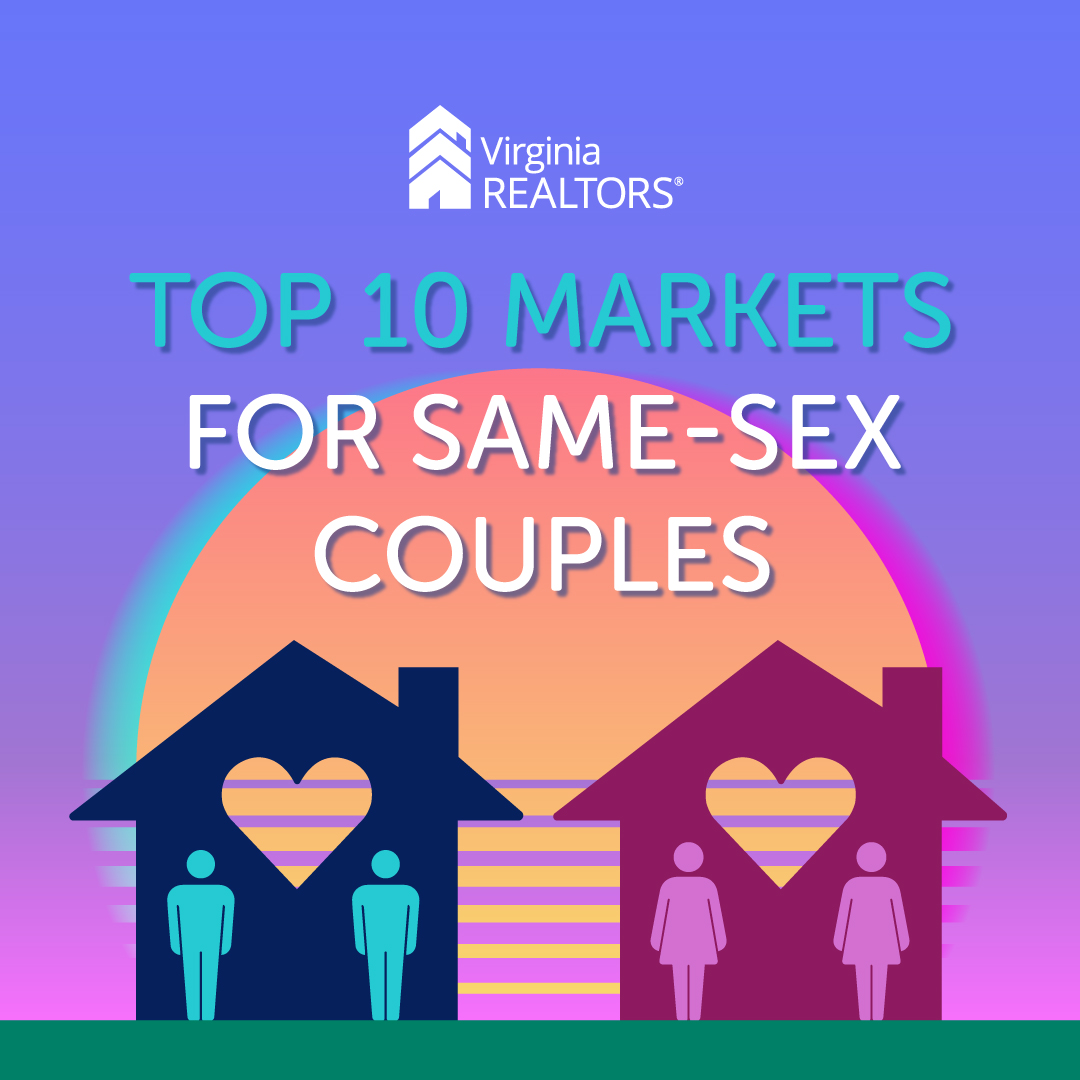Top 10 Markets in Virginia for Same-Sex Couples
June 18, 2020

As Virginia and the rest of the nation observe LGBTQ Pride Month, Virginia REALTORS® is taking a look at same sex partner households across the Commonwealth. Nationwide, according to the U.S. Census Bureau, unmarried partner households accounted for 6.2% of all households, and same sex unmarried partner households accounted for 0.34% of all households. (Unmarried partner households include people living together as life partners and do not include people living together as roommates.)
In Virginia, 5.3% of all households are unmarried partner households and 0.30% are same sex unmarried partner households. While the overall number of same sex partner households is small, the number has been growing in many communities across Virginia. In addition, the National Association of REALTORS® reports that gay, lesbian and bisexual individuals comprise 4% of recent home buyers and sellers nationwide.
Not surprisingly, the greatest numbers of same sex couples in Virginia live in the state’s largest communities, primarily in the Northern Virginia, Richmond, and Hampton Roads regions. However, the counties and cities with the largest shares of same sex partner households include a diverse set of communities around the state.
According to U.S. Census Bureau data, more than one percent of households in Clarke County are same sex partner households, a rate more than three times the statewide rate. The independent cities of Alexandria, Winchester, Richmond, Petersburg, and Charlottesville all have relatively high shares of same sex partner households as well, as do Lancaster, Wise, and Arlington counties.
Number of Same Sex Partner Households, 2018
| Rank | County/Independent City | Number |
| 1 | Fairfax County | 1,214 |
| 2 | Arlington County | 703 |
| 3 | Richmond city | 582 |
| 4 | Alexandria city | 536 |
| 5 | Henrico County | 432 |
| 6 | Chesterfield County | 376 |
| 7 | Virginia Beach city | 353 |
| 8 | Newport News city | 349 |
| 9 | Norfolk city | 320 |
| 10 | Chesapeake city | 299 |
Source: U.S. Census Bureau, American Community Survey
Share of Same Sex Partner Households, 2018
| Rank | County/Independent City | Percent |
| 1 | Clarke County | 1.05% |
| 2 | Norton city | 0.82% |
| 3 | Alexandria city | 0.77% |
| 4 | Winchester city | 0.75% |
| 5 | Lancaster County | 0.72% |
| 6 | Wise County | 0.70% |
| 7 | Arlington County | 0.67% |
| 8 | Richmond city | 0.65% |
| 9 | Petersburg city | 0.64% |
| 10 | Charlottesville city | 0.64% |
Source: U.S. Census Bureau, American Community Survey
The National Association of REALTORS® has found that lesbian and gay home buyers and sellers tend to have slightly higher incomes than heterosexual buyers and sellers, and are more likely to live in urban areas. Given that Millennials make up a greater share of home buyers, and reflecting shifting attitudes regarding sexual orientation, it is likely that the proportions of lesbian and gay home buyers and sellers will increase in the years to come.
REALTORS® have always embraced the importance of protections secured by the Fair Housing Act, and REALTORS® have support expansion of protections to LGBTQ individuals. The REALTOR® Code of Ethics was amended years ago to prohibit discriminations based on sexual orientation and gender identity. Expanding access to homeownership for all in Virginia is part of REALTORS®’ commitment to Virginia communities.
You might also like…
Virginia’s Ranks 17th for In-Migration in the United States
By Sejal Naik - February 18, 2025
Every year, U-Haul releases a ranking of U.S. states based on their estimates of growth in population since the prior year. This ranking helps understand the net influx… Read More
Virginia’s Thriving Labor Market in 2024
By Abel Opoku-Adjei - February 3, 2025
The labor market in the U.S. showed resilience in 2024 despite the looming economic uncertainty amongst many Americans. According to the recent Bureau of Labor Statistics data, approximately… Read More
The Silver Tsunami: Its Impact on the Housing Market
By Abel Opoku-Adjei - January 30, 2025
The term “Silver Tsunami,” often referred to as “empty nesters,” describes the impending wave of Baby Boomers (individuals born between 1946 and 1964) who are approaching retirement. Baby… Read More